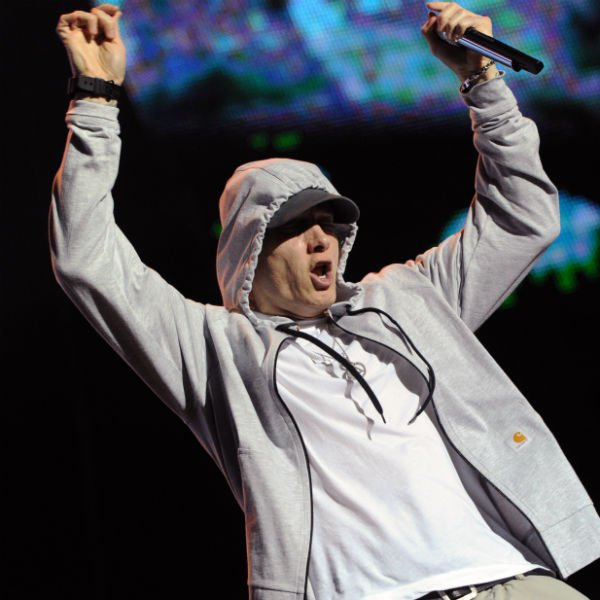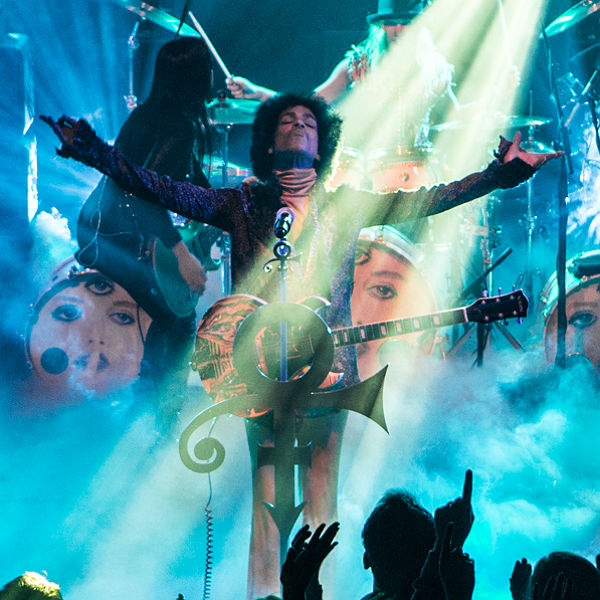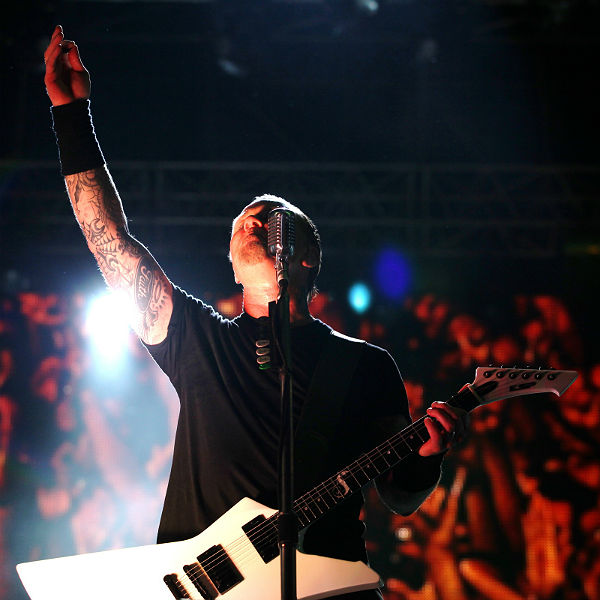
Photo:
It's a gloomy, damp, and thoroughly miserable day when I meet two fifths of The Horrors on Shacklewell Lane. Originally ushered into their recording studio next door (an inevitably eclectic labyrinth of instruments and clutter, of which frontman Faris Badwan later says in a mournful fashion "helps us forget where we are"), I end up meeting Faris and Tom Cowan in a bustling cafe next door.
I sit down with them to talk about their forthcoming album, Luminous. Badwan is polite and intense, scribbling furiously in a notebook when he's not answering a question. Cowan is friendly and outgoing, the sunnier ying to Faris' glowering yang.
Luminous is set to continue their unbroken run of critically-acclaimed records (2009's Primary Colours was even nominated for the Mercury Prize). The early reviews are in, and they're promising - do they read them?
"It seems like a weird thing," Faris says. "For me, the most annoying reviews are when you're a little bit unhappy with a song, and someone picks up on it - when there's a little grain of truth in it. That drives me insane, because I find it hard when I agree with the reviewer."
"I think the important thing to remember is that it's just an opinion," adds Tom. "But when it's an opinion presented as fact...it can be frustrating when people put things on you. It's very presumptious."
The Horrors (completed by guitarist Joshua Hayward, bassist Rhys Webb and percussionist Joe Spurgeon) have been compared, variously, to LCD Soundsystem, The Psychedelic Furs, Can, Spiritualized, Deerhunter and Simple Minds ("I know that song 'Don't You Forget About Me'," quips Faris. "It's a good one"). There's barely a review of any of their three existing records that fails to compare them to another act. Is it important to keep developing and changing their sound to ward these constant resemblances off?
"I think we develop because the whole essence of the band is about the desire to learn, improve, experiment and discover things. I think that's what we find exciting about making music," Faris declares. "That's what we enjoy about it, so, naturally we'll be experimenting with new techniques and new kinds of songs with each record. That's what makes it fun.
"Making the same record again and again is like some kind of weird purgatory - like a hellish nightmare," he adds, in a bemused fashion.
In 2011, the band recorded - and for the first time, produced - their album Skying in their aforementioned studio in Hackney. Luminous was also recorded in the same space. The studio is clearly a great source of inspiration for them, rather than the city itself; Faris speaks of it with a clear fondness.
"I think our studio helps us forget where we are," he explains. "I don't know if London itself is that inspiring, because we create our own world, really, and that's what the records are - each one is its own world, and the studio is its own world. It's got no connection with the outside."
The band's detachedness from the outside world possibly stems from the uneasy relationship they've had with the press. Much has been made of how different The Horrors' look and sound is now, in comparison to their backcombed hair, black garb, and the garage-rock of their much-hyped debut Strange House.
Understandably, they become slightly irked when it's mentioned in interviews - but a quick look at Strange House's reviews shows it got 5 stars from The Guardian, whilst Mojo and Observer Music Monthly gave it 8/10.
"It did, yeah! Thanks. Thanks for acknowledging that," splutters Tom. "There's a mythology that says [Strange House] got slated, and that somehow we managed to turn it all around, but it's actually not true."
Faris takes a slightly more positive approach to the misinterpretations of the band's beginnings. "It works for us, y'know," he says. "Most bands need a story. People need to hear about how a band have fought against terrible beginnings - it's useful for us. I don't really mind."
However, as Faris explains, "It hasn't been straightforward. At the start we were percieved slightly differently from what was accurate, so we had to go through that."
Indeed. Rewind to 2006, and after just one single (The frantic 'Sheena Is A Parasite') the quintet are splashed across the front cover of the NME in a comically ghoulish reimagining of Queen's iconic, shadowy Bohemian Rhapsody artwork. The band's striking appearance and sound saw them instantly tagged as one-dimensional, hipster goth revivalists, and it threatened to engulf them. An appearance on The Mighty Boosh didn't exactly help things either.
With Primary Colours, The Horrors shed the look and the sound that defined but damned them, and it's been plain sailing ever since. The band are constant fixtures at festivals, continue to sell a decent amount of records, and, simply put, stay effortlessly relevant. But it could have been a different story.
In 2007, they were sent on the NME Awards Indie Rock Tour alongside The Automatic, Mumm-Ra and The View - three bands who were, at the time, their counterparts, but all but disappeared long ago. How did The Horrors survive the hype that destroys so many acts?
"Any band that you hear about again and again, over and over, will either back it up or they can't, and you'll find out very quickly," replies Faris. "We've seen so many bands come and go, it's weird. It feels like we haven't been in a band very long, but it's been nearly 10 years and we've seen so many bands disappear."
They're also, quite simply, a rather good band, as Tom points out: "We've kept ourselves excited and as a result we've kept other people excited. We actually backed it up - we backed up the hype with good records, being great to watch live and being a decent band."
This self-assurance is certainly not misplaced. In 8 years, they've gone from being unfairly dismissed as an over-hyped throwaway act to one of Britain's most respected and inventive bands. In another 8 years, who knows where they'll be? One thing's for sure: The Horrors are a band that inspire confidence.
Luminous is released May 5.































